Consistency Over Volume
How hitting easy exercise and nutrition goals for 50 days in a row have improved my overall health.
For the last 50 days, I have swapped out sporadic, rigorous, endurance-type exercise for a more sustainable, consistent, moderate exercise as I try to find a more sustainable, family-friendly balance and help me repair my relationship with food.
I want to share the results to show people that we don’t have to go to extremes to achieve results and feel better day in and day out, but first, I wanted to share a bit of background.
Background
I used drugs and alcohol to avoid difficult feelings and thoughts. I realised later that I had arrived at a point where I would use them before any difficult thoughts or feelings would arise. It was almost like I was being proactive against them. My subconscious thought it was clever to stay one step ahead.
I’ve been sober for almost 18 months. If there is one key takeaway from this journey, it is that actual results are achieved by incremental behavioural change over extended periods. I’ve made a lot of progress in those 18 months, but the beauty of sobriety, so far at least, is that you continue to learn more about yourself daily. Sometimes it’s fuckin’ hard, but many of the things sobriety reveals about yourself are amazing.
It wasn’t until I injured my back in February that I realised I was still using other things to avoid feeling things, namely food and exercise. The old saying, you don’t know what you got ‘til it’s gone, rings true. I didn’t realise how much I relied on exercise to manage my physical and mental health. It wasn’t until my ability to exercise was taken away from me that it became glaringly obvious.
I became too dependent on exercise as a coping mechanism when I got sober. I knew it, too. I always worried that a serious injury could be the catalyst of a relapse because I hadn’t yet developed other healthy coping mechanisms, not enough anyway.
So back in February, when I injured my back, things started to reveal themselves to me. Obviously, I went through a period where I was a little miserable. Not only do I use exercise to help manage my mental health, but I genuinely enjoy it.
Gradually, I started to gain weight. I was conscious that losing the ability to exercise, at least to the level I was used to, would mean I wouldn’t be able to burn the amount of calories I was used to burning, yet I still struggled to reduce my intake.
On reflection, I can see why. Even though I was conscious of the need to reduce my food intake relative to the reduced exercise load, I couldn’t do it. I thought at the time that maybe it was just because that’s how much food I was used to eating. It wasn’t until I reflected later that I realised it was actually because I was using food as a coping mechanism. I didn’t have many left to use. Drugs and alcohol were out of the question, and now I couldn’t exercise. Food was all that was left.
As I have said in the past, food is difficult to manage because you can’t just stop eating. Eventually, you’ll die.
I realised that I was using food as a coping mechanism when I reflected on my eating habits. When I am busy, I have no issues with food. In fact, I often hyperfocus so hard on the task at hand that I forget to eat or don’t even notice my own hunger, a common ADHD trait. It was only when I was bored that I would struggle with food, and I knew it was avoidance because of the types of food I was craving. I never sat down and ate a bowl of steamed veggies because I was bored. It was always those sweet, dopamine-inducing, calorie-dense snack foods.
When I hurt my back in February, I weighed around 91kg and felt really good. By July, my weight had crept up to 99.6kg. The good news was that I had rehabbed my back enough to start exercising properly again, but I had a lot of work to do.
I’d been in similar situations before and knew I could move the weight. However, my life had changed significantly, and I didn’t have as much disposable time as I used to. I knew that my relationship with both food and exercise had become unhealthy, and something needed to change.
(Click here to read The Complicated Relationship Between Sobriety and Exercise, where I speak about how I developed an unhealthy relationship with both exercise and food.)
We went on a family holiday to Thailand at the end of July. It was hot and humid. I didn’t want to be selfish and take away from my family’s experience by exercising for hours every day, so I decided that just for this trip, I would just run for 30 minutes a day, first thing every morning, and be home before they woke up. Overseas trips don’t come around all that often, and I wasn’t going to ruin it by being worried about food and exercise.
I accidentally stumbled across a bit of a silver bullet, though. After a few days, I realised that my body was responding well to 30 minutes of running each day. I was sleeping well, had enough energy to be present with my family throughout the day, and felt good. I stuck to it for the rest of the two-week-long trip and continued to reap those same benefits.
When I arrived home, I decided to reach out to my friend and nutritionist, James Kuhn. I had worked with James before, but this was two years ago when I was trying to run PBs and considering getting into ultra-endurance running events. Things were different now.
I told him I needed a plan based only on what my body naturally burns in a day, and I would try to exercise for 30 minutes a day on top of that. I felt I could commit to 30 minutes a day, and if I could base my eating around that, it would help me to improve my damaged relationship with food. I felt like the extreme eating binges were partially to blame for me feeling obligated to run a half marathon on a fucking Wednesday afternoon for no real reason, and vice versa. If I could learn to eat relative to my body’s needs, the exercise would be a bonus, and I wouldn’t need to berate myself for missing a day of exercise or not running a fucking stupid volume of kilometres each week.
It’s funny how the universe will find a way to tell you things when you need to hear them. I heard Mindset Coach to the Stars Ben Crowe say on a podcast that we should change the scope, not the process. This means that if you usually run for an hour every day, but today you only have 15 minutes spare, go for a fucking 15-minute run. In the past, I have been guilty of not exercising because I didn’t have enough time to exercise for as long as I usually would. I couldn’t bear the thought of uploading an unimpressive workout to Strava so a bunch of people on the internet could see that I didn’t have a go that day.
So, with James setting me up on a plan of roughly 2200 calories per day and 150 grams of protein, I came up with a bit of what I prefer to refer to as a movement plan rather than an exercise plan. Each day, I wanted to achieve one of the four things below.
30-minute run.
40-minute bike ride
20,000 total steps
A workout of over 400 calories burned.
Instead of running for three hours on a Sunday and being too fucked to do anything on Monday and feeling like a hopeless piece of shit because of it, I wanted to see if a more moderate, consistent approach would work for me because it would certainly help with my mental health.
For some added accountability and to make a bit of a game of it, I wanted to see how many days in a row I could achieve at least one of these things.
Yesterday, I reached 50 consecutive days. Seven weeks and one day. It’s been a great success so far, and I wanted to share the results so that people can see what I wish I could have seen years ago. I want people to see that we don’t have to go to extremes. If we make a concerted effort to make more good decisions than bad ones each day, progress will come so long as we are patient and we are motivated to do things because we want to feel good and not because we want to hit some fucking metric on a scale.
Results
For transparency, I will add that all metrics mentioned are from my Garmin Fenix 6. I understand that metrics from wearables are not completely accurate. However, I do believe that when we use the same instrument to measure progress over time, the trends we see can be considered fairly accurate.
Resting Heart Rate
You can see that after I hurt myself in February, my RHR went to the dogs. Makes sense. I have marked two areas in yellow. The first one around the start of August is, when I started trying to run for 30 minutes every day. The second mark is where I started to dial in my nutrition. Both events saw a significant drop in RHR.
But why does this matter? The average human heart will beat 2.5 billion times in a 70-year lifetime. A normal resting heart rate is anywhere from 60 - 100 bpm. The better your cardiovascular fitness, the less your heart will beat during rest and normal daily activity. Ironically, the only way to increase your cardiovascular fitness is by elevating your HR for a period of time.
I used ChatGTP to come up with a very rough, very quick calculation to show how having a lower resting HR can increase our longevity. Please keep in mind this is purely for demonstration purposes only, and I am well aware that there are many other factors to consider. It’s purely an example.
Heart Rate Variability
Heart rate variability is a measure of time between two heartbeats. Health benefits of having a higher HRV include reduced risk of cardiovascular disease. Improved stress management and physical recovery. Improved emotional regulation and reduced anxiety. Improved physical performance and recovery. Enhanced cognitive functions such as focus and memory.
I find that the better my resting heart rate, the higher my HRV is. Garmin only stores HRV data for the last four weeks. But to give you an idea, I will list my average overnight minute average HRV over the last four months below.
July = 72
August = 85
September = 88
October so far = 96
Click here to read more about HRV.
Sleep
Over the last 18 months, I've learned that almost all of my physical and mental health metrics boil down to how well I am sleeping. I’ve spoken about sleep many times on this blog over the last 12 months so that I won’t bore everyone with that stuff, but we all know that we feel and perform better when we are sleeping well, but I think sometimes we forget just how much of an impact it can have.
Below, you can see where my overall sleep score has improved from when I first started exercising more consistently and then again when I dialled in my nutrition.
The quality and productivity of our day start the night before. I am doing enough exercise to wear me out but not too much that I can’t recover overnight, so my sleep quality has improved significantly.
Stress
Life can be fuckin’ hard at times. But I don’t think we fully realise how much harder we make it on ourselves by not taking care of ourselves. We mightn’t realise it, but stress has a physiological impact on our bodies, as well as a mental impact.
I’ve marked this graph in three places. The first place is where my stress dipped at the start of my overseas holiday. The second is when I returned and struggled with a little bit of jetlag and adjusting back to work and my regular time zone. The third mark is where I started focusing on my nutrition.
Weight
I was reluctant to put this in here because I think having weight loss goals can be dangerous to our mental health. It feels great when we hit them, but it can be devastating when we don’t hit them, and it can encourage us to do dumb unhealthy shit to see a certain metric show up on a scale.
I didn’t and don’t have a body weight target. I just wanted to be healthier and happier and to feel better day in and day out.
Weight, however, is a great, objective measurement that clearly shows us what direction we are trending. We need to be mindful of all the day-to-day variables that can affect it. If you wake up today and weigh yourself after having a poo, then have a massive glass of water before bed tonight, then weigh yourself tomorrow morning before your morning poo, you could be half a kg heavier than you were yesterday morning, irrelevant of what calorie deficit you were in the day before.
My nutritionist has me weighing myself every day, but when I want to look at my progress, I compare myself to what I weighed 7 days ago instead of the day before. It reminds me that my trajectory is good and that I don’t need to get upset if I’m heavier than yesterday, and I certainly don’t need to do some dumb shit like run a fasted half-marathon in the middle of the afternoon when it’s 28 degrees.
I was 99.6kg at the end of July when I left for my holiday. When I started with my Nutritionist around the end of August, I was 96.6kg. This morning, I was 89.6kg.
I’ll even throw in a little before and after progressive photo for you sickos who think I’m full of shit.
I’m happy with my progress to date and hoping to get even more, but I’m not going to be changing my approach anytime soon. What I am doing is working for me, my family and my health in general. Whatever I weigh, I weigh. As long as I feel good and these other health markers are good, it doesn’t really matter.
Summary
I’m not an expert. Nor am I claiming to be. I know that I have shared things like this in the past which can make me seem like I am a hopeless bastard who can’t keep my shit together. Like I bounce from one thing to the other. But this is the whole point. I needed to change to something sustainable. It was less extreme at both ends, and I needed to find a way that could work that didn’t impact the time I spent with my young family.
The point of all of this is not to go and do exactly as I have done but to find something that works for you and where you are in your life. I’m not a psycho. I still have an ice cream or a chocolate every single day, and I’m not running 100k weeks anymore to justify it.
I admitted I needed a little bit of help and paid someone who knew what the fuck they were talking about to guide me in the right direction. It takes a bit of organisation to have my exercise gear with me and sneak my training in each day. It’s a little bit annoying tracking calories, too. Sometimes I feel like pigging out and all the bad shit I can get my hands on, but I now know that happens not because I’m hungry but because I am avoiding dealing with something difficult.
Ultimately, the friction between me and exercising and the friction between me and eating more mindfully pales in comparison to the sense of reward I have been given just for feeling better. I didn’t even mention that my physical performance has improved. My Garmin fitness age is now at 29.5. I turn 35 next month.
Most importantly, though, I have found a way to get exercise every day and achieve a healthy body weight and level of fitness that has minimal impact on my family. It means I have more energy for my family, and it means that if I continue on this path, I will be around for my family for a lot longer than I would have been otherwise, and that is ultimately what matters the most.
Hopefully I can help someone else achieve the same thing.
Cheers Wankers.
X.
Click here to check my other blogs. Follow me on Instagram and Twitter @sbrngthghts.
Make sure you check out my Writing 4 Resilience friends. They’re all legends.
Running for Resilience Ben Alexander Brent Ford Running Rare The Milkbar Reflections of a Clare Bear
If anyone is struggling in any way, make someone aware of it. Speak to a friend, family, loved one, stranger, postman, Uber Eats driver, or me; talk to someone.
Lifeline Ph: 13 11 14
Alcoholics Anonymous Ph: 1300 222 222
NSW Mental Health Line Ph: 1800 011 511
Suicide Call Back Service Ph: 1300 659 467
Mensline Australia Ph: 1300 78 99 78
Kids Helpline Ph: 1800 55 1800


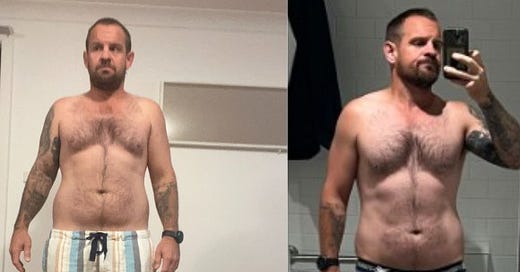


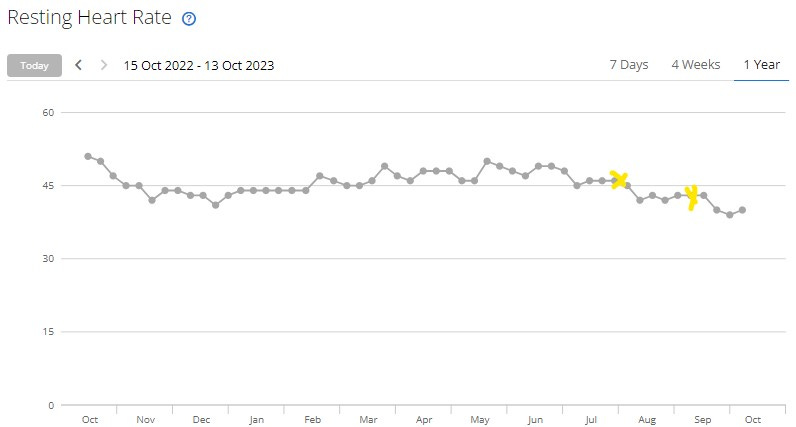
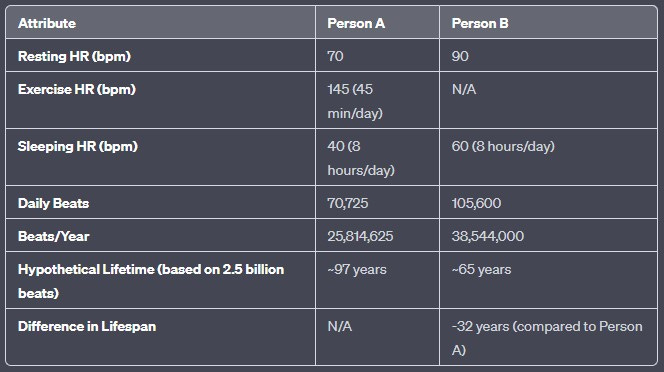
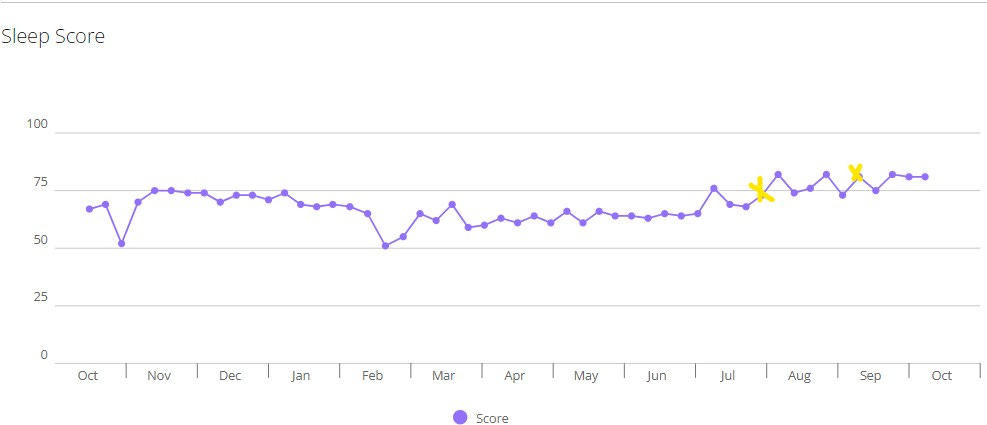
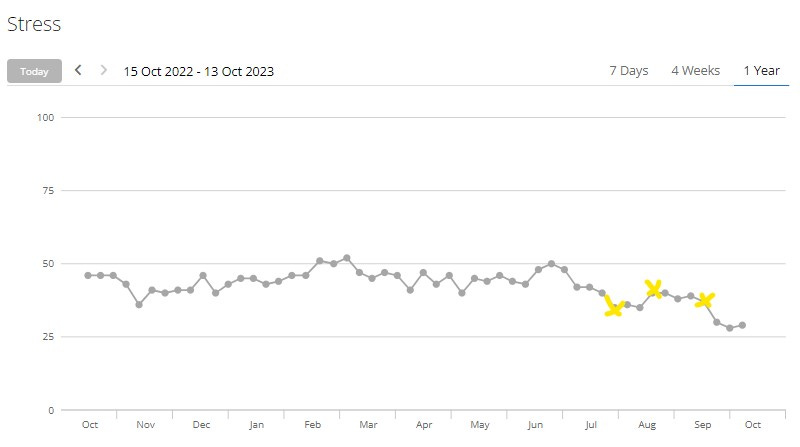
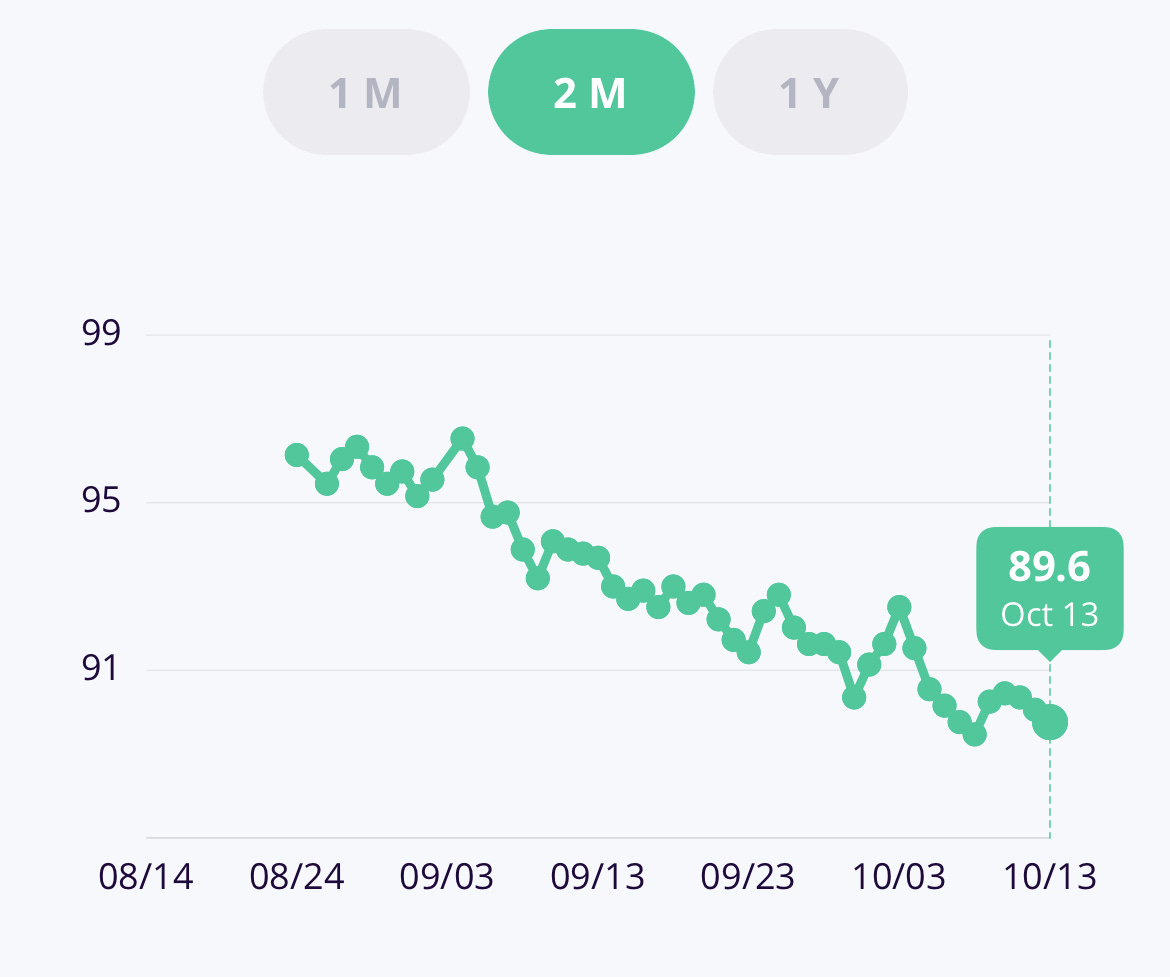

Nice work Sam. You got really wonderful results.
"I want people to see that we don’t have to go to extremes." - Why is that and why do people always do that? Why is finding balance so hard?